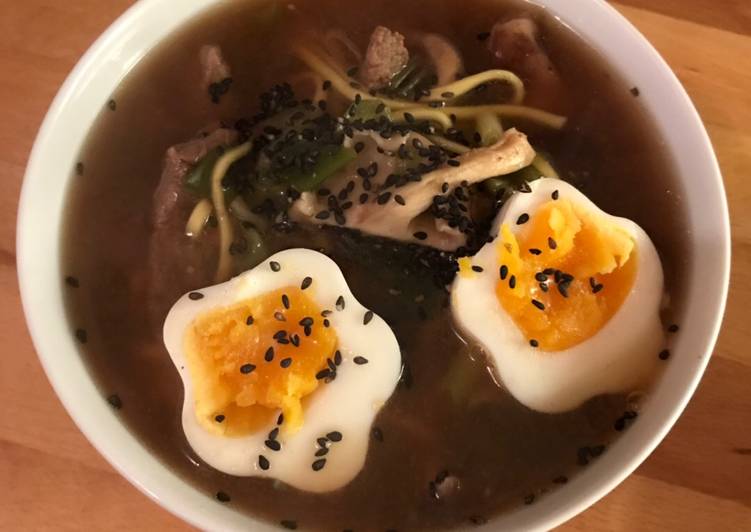
Hello everybody, I hope you’re having an incredible day today. Today, we’re going to make a special dish, beef ramen with ajitsuke tomago. It is one of my favorites food recipes. For mine, I will make it a bit unique. This will be really delicious.
Beef ramen with ajitsuke tomago is one of the most well liked of current trending meals in the world. It is easy, it is quick, it tastes yummy. It is enjoyed by millions daily. Beef ramen with ajitsuke tomago is something that I have loved my whole life. They are nice and they look wonderful.
With ajitsuke tamago, there's another culprit: salt. We all know that salt can have a powerful effect on food, right? In the case of bacon or ham, for instance, salt not So it is with ajitsuke tamago.
To get started with this particular recipe, we have to first prepare a few components. You can cook beef ramen with ajitsuke tomago using 14 ingredients and 9 steps. Here is how you can achieve that.
The ingredients needed to make Beef ramen with ajitsuke tomago:
- Prepare 2 nests of ramen egg noodles
- Make ready 150 g frying steak
- Take 500 ml chicken stock
- Make ready 1 sheet Dashi seaweed
- Take 2 teaspoons miso paste
- Make ready 2 ajitsuke tomago (Japanese pickled eggs pre-made per other recipe)
- Take 1 small chunk of diced ginger
- Take 1 tablespoon soy sauce
- Get 200 g shiitake mushrooms
- Make ready 4 spring onions chopped
- Take 100 g baby spinach
- Make ready Sprinkle of black sesame seeds (optional)
- Take Sprinkle of dried tuna flakes (optional)
- Prepare 1 tablespoon sesame oil
Jammy Ramen Eggs (Ajitsuke Tamago) - These are sweet, salty and rich with plenty of umami flavor. Sweet, salty and rich with plenty of umami flavor - these jammy Ramen Eggs (Ajitsuke Tamago) are simple, versatile and perfect in your ramen bowl, or any other way you eat. The key to ramen eggs (known in Japanese as ajitsuke tamago 味付け卵) is that they aren't just flavoured by their marinade. Luxuriously gelatinous yolks of the ramen egg, aka ajitsuke tamago, are worth getting excited over.
Instructions to make Beef ramen with ajitsuke tomago:
- Prepare dashi (seaweed stock) per packet instructions. Mine involved wiping clean the seaweed, soaking it in 3.5 cups of water and refrigerating for 6 hours or so. Then slowly heating seaweed and water to just boiling and discarding the seaweed. Using dashi in a later step.
- Chop steak and vegetables as desired
- In a new pan, slowly cook chicken stock until simmering/ softly boiling.
- Fry beef in sesame oil and soy sauce with ginger in a separate pan
- Add vegetables to steak (set some spring onion aside if you want some crunchy vegetables as a topping later)
- Mix miso paste with 150 ml boiling water and add to pan of chicken stock. Also add dashi made in step one.
- Add noodles to boil for 3 to 4 minutes in stock pan. Add steak and vegetables to stock pan. Add baby spinach. Cook together until noodles are tender.
- Remove ajitsuke tomago from moulds and slice in half if desired
- Serve ramen broth into bowls. Add ajitsuke tomago, black sesame seeds, dried tuna flakes, fresh spring onion and herbs as desired. Season with salt and pepper if necessary.
They add a firmer texture and seasoning to the whites, as well as mamking the yolks much more mesmerizing and jammy. Ajitsuke Tamago - perfect eggs IMO. Something I whipped up the other day. Soy sauce maruchan ramen topped with ajitsuke tamago, pork rib chashu, kamaboko, spicy bean sprouts, negi, rayu oil and a side of crispy lattice gyozas. Ajitsuke Tamago (味付け卵), better known as ramen eggs, are first soft-boiled before being marinated in a sweet and savory broth.
So that is going to wrap it up with this special food beef ramen with ajitsuke tomago recipe. Thanks so much for reading. I am sure that you can make this at home. There’s gonna be more interesting food in home recipes coming up. Remember to bookmark this page on your browser, and share it to your family, friends and colleague. Thank you for reading. Go on get cooking!


